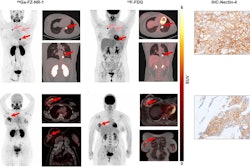F-18 fibroblast activation protein inhibitor (FAPI) PET/CT leads to significant upstaging in newly diagnosed breast cancer, according to research published September 5 in Academic Radiology.
A team led by Liu Junzhi, PhD, from the China-Japan Union Hospital of Jilin University in Changchun, China, found that the modality leads to upstaging at a higher rate than that of F-18 FDG PET/CT.
“The significantly higher lesion-based sensitivity in unsuspected metastases implies a future role of F-18 FAPI PET/CT in evaluation of metastatic disease burden,” the team wrote.
While F-18 FDG PET/CT can change disease staging and management in newly diagnosed breast cancer patients, the use of the modality in everyday clinical practice is still limited. The researchers noted that this is partly due to low FDG uptake in some histopathological types and “suboptimal detectability” in micrometastasis.
They suggested that FAPI tracers could overcome these obstacles due to their rapid tracer accumulation in target lesions and low background signal.
“Due to the large amount of tumor stroma in breast cancer micro-environment, FAPI tracers are expected to show intense uptake in all types of breast cancer, including those with low glucose uptake,” the researchers wrote. “Moreover, FAPI tracers also enable higher sensitivity in detecting small malignant lesions.”
The team put F-18 FAPI PET/CT to the test, comparing results to those of F-18 FDG PET/CT in systemic staging of newly diagnosed breast cancer.
The retrospective analysis included data collected in 2022 and 2023 from 38 women with initial clinical stage IIB-IIIC breast cancer. The women underwent both F-18 FAPI and F-18 FDG PET/CT in the study period.
F-18 FAPI led to an overall upstaging rate of 47.4% compared to 34.2% for F-18 FDG. F-18 FAPI also led to the following rates of distant metastases in the women: 5.5% in stage IIB patients, 30% in stage IIIA patients, 50% in stage IIIB patients, and 75% in stage IIIC patients.
Additionally, F-18 FAPI demonstrated significantly higher sensitivity values in detecting unsuspected regional lymph node metastases on patient- and lesion-based analysis, as well as finding distant metastases on lesion-based analysis.
| Sensitivity comparison of F-18 FDG, F-18 FAPI | |||
|---|---|---|---|
| Measure | F-18 FDG | F-18 FAPI | p-value |
| Patient-based analysis | |||
| Detecting URNM | 53.8% | 100% | 0.031 |
| Detecting distant metastases | 90% | 100% | 1 |
| Lesion-based analysis | |||
| Detecting URNM | 52.4% | 97.6% | < 0.001 |
| Detecting distant metastases | 67.3% | 98.1% | < 0.001 |
Finally, neither modality yielded false-positive findings.
The study authors highlighted that the higher accuracy demonstrated by F-18 FAPI could help optimize therapeutic decisions and clinical outcomes for breast cancer patients.
“With a higher sensitivity, F-18 FAPI may more confidently ensure a true oligometastatic disease status and thus serve as a better tool to select patients who could benefit from these locally aggressive therapies and have prolonged survival,” they wrote.
The full study can be found here.



















